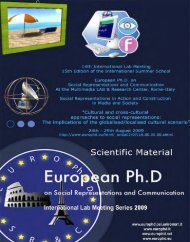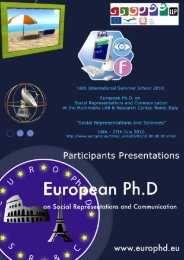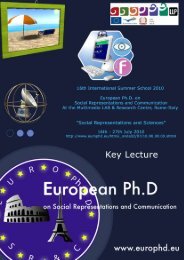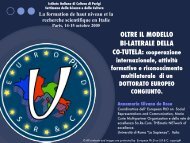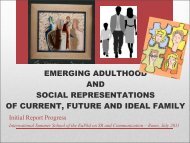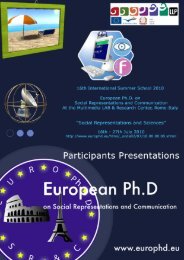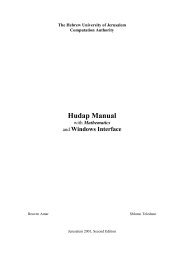The "boomerang" effect of the radicalism in discourse analysis
The "boomerang" effect of the radicalism in discourse analysis
The "boomerang" effect of the radicalism in discourse analysis
Create successful ePaper yourself
Turn your PDF publications into a flip-book with our unique Google optimized e-Paper software.
contribut<strong>in</strong>g towards creat<strong>in</strong>g <strong>the</strong> same context <strong>of</strong> <strong>the</strong> <strong>in</strong>teraction. <strong>The</strong> characteristics <strong>of</strong><br />
<strong>the</strong> <strong>in</strong>teraction exert an <strong>in</strong>fluence on <strong>the</strong> memory, no less than that which <strong>the</strong> memory<br />
does <strong>in</strong> structur<strong>in</strong>g and orient<strong>in</strong>g <strong>the</strong> <strong>in</strong>teraction.<br />
<strong>The</strong> memory is nourished by <strong>the</strong> social <strong>in</strong>teractions and by <strong>the</strong> <strong>in</strong>terpersonal<br />
exchanges produced <strong>in</strong> an extensive temporal context. <strong>The</strong> memory conta<strong>in</strong>s scripts that,<br />
although adaptable to <strong>the</strong> requirements <strong>of</strong> immediate and fluctuat<strong>in</strong>g situations <strong>in</strong> <strong>the</strong><br />
time, show even relatively stable characteristics. Although variable, <strong>the</strong> cont<strong>in</strong>gent<br />
<strong>discourse</strong>s always <strong>of</strong>fer <strong>the</strong> trace <strong>of</strong> a <strong>discourse</strong> spoken and performed previously with<strong>in</strong><br />
a social context. <strong>The</strong> social representations are partly a trace <strong>of</strong> an <strong>in</strong>teriorised repertoire<br />
<strong>of</strong> past knowledge and experience, expressed <strong>in</strong> <strong>the</strong> <strong>discourse</strong>s <strong>of</strong> <strong>the</strong> present and that<br />
are jo<strong>in</strong>ed <strong>in</strong> <strong>the</strong> present with new mean<strong>in</strong>gs, <strong>in</strong> a constant dynamic <strong>of</strong> stability and<br />
change.<br />
Also <strong>the</strong> <strong>the</strong>ory <strong>of</strong> <strong>the</strong> social representations (and more specifically <strong>the</strong> development<br />
<strong>of</strong> <strong>the</strong> concept <strong>of</strong> "<strong>the</strong>mata" (see Moscovici & Vignaux, 1994) is opposed to a certa<strong>in</strong><br />
narrow and solipsistical way <strong>of</strong> conceiv<strong>in</strong>g <strong>the</strong> knowledge, but not deny<strong>in</strong>g it highlights<br />
its socially and historically situated aspect, open<strong>in</strong>g it up to symbolic mean<strong>in</strong>gs that go<br />
well beyond those <strong>of</strong> merely <strong>in</strong>formative nature. This permits it an <strong>in</strong>terest<strong>in</strong>g<br />
<strong>in</strong>tegration with <strong>the</strong> construct <strong>of</strong> <strong>the</strong> social memory, cast<strong>in</strong>g a bridge between collective<br />
representations and social representations, between diachronic and synchronous<br />
perspectives (Jodelet, 1993; de Rosa, 1997; de Rosa & Morm<strong>in</strong>o, 2000; Bellelli,<br />
Bakhurst, Rosa, 2000).<br />
“<strong>The</strong>mata” never reveal <strong>the</strong>mselves clearly; not even part <strong>of</strong> <strong>the</strong>m is def<strong>in</strong>itively atta<strong>in</strong>able, so much<br />
are <strong>the</strong>y <strong>in</strong>tricately <strong>in</strong>terwoven with a certa<strong>in</strong> collective memory <strong>in</strong>scribed <strong>in</strong> language, and so much are<br />
<strong>the</strong>y composites, like <strong>the</strong> representation <strong>the</strong>y susta<strong>in</strong>, at once both cognitive (<strong>in</strong>variants anchored <strong>in</strong> our<br />
neurosensory apparatus and our schemes <strong>of</strong> action) and cultural (consensual universal <strong>of</strong> <strong>the</strong>mes<br />
objectified by <strong>the</strong> temporalities and histories <strong>of</strong> <strong>the</strong> longue durèe).<br />
(Moscovici & Vignaux, 1994, eng. transl.<strong>in</strong> Moscovici, 2000, p. 182)<br />
<strong>The</strong> two visions could be considered complementary, if <strong>the</strong> contigentist <strong>radicalism</strong><br />
declared by <strong>the</strong> RDA did not end up by deny<strong>in</strong>g <strong>the</strong> supposition itself <strong>of</strong> <strong>the</strong><br />
communication, i.e. <strong>the</strong> existence <strong>of</strong> that reciprocally shared field <strong>of</strong> mean<strong>in</strong>gs and <strong>of</strong><br />
representations already dear to Mead.<br />
That <strong>the</strong> two paradigms should have been able to be <strong>in</strong>tegrated - if a <strong>radicalism</strong> had<br />
not prevailed, which <strong>in</strong> mak<strong>in</strong>g absolute <strong>the</strong> importance <strong>of</strong> <strong>the</strong> <strong>discourse</strong> has ended up<br />
by deny<strong>in</strong>g all that is made necessary for it (from <strong>the</strong> representation to <strong>the</strong><br />
communication) - is explicitly recognised on several occasions by Billig (1987, 1991)<br />
who has devoted a whole chapter (<strong>the</strong> third) <strong>of</strong> his Ideology and Op<strong>in</strong>ion to "explor<strong>in</strong>g"<br />
<strong>the</strong> po<strong>in</strong>ts <strong>of</strong> contact between <strong>the</strong> <strong>the</strong>ory <strong>of</strong> <strong>the</strong> social representations and <strong>the</strong> rhetorical<br />
approach, underscor<strong>in</strong>g <strong>the</strong> argumentative and rhetorical dimension <strong>of</strong> what Mosovici<br />
calls "social representations".<br />
“At first sight, <strong>the</strong> rethorical approach’s stress on argumentation could be <strong>in</strong>serted <strong>in</strong>to Moscovici’s<br />
vision <strong>of</strong> a reconstituted social psychology.(…) One <strong>of</strong> <strong>the</strong> most important developments <strong>in</strong> European<br />
social psychology has been <strong>the</strong> emergence <strong>of</strong> <strong>the</strong> concept <strong>of</strong> ‘social representations’. (…)<strong>The</strong> rethorical<br />
perspective, it will be suggested, can complement that <strong>of</strong> <strong>the</strong> social representations <strong>the</strong>orists, regardless <strong>of</strong><br />
wheter <strong>the</strong> universal or particular concept <strong>of</strong> social representations is adopted.”<br />
(Billig, 1991, p. 57-9)<br />
38




